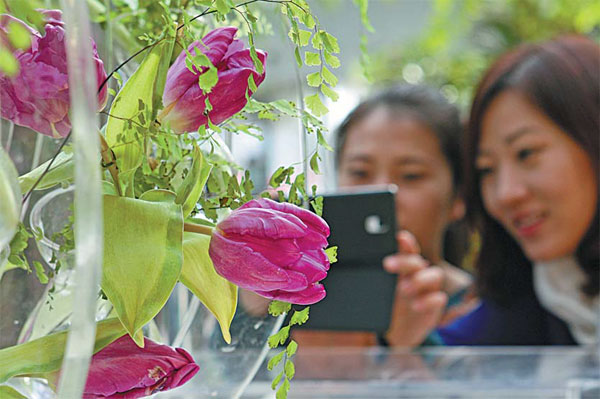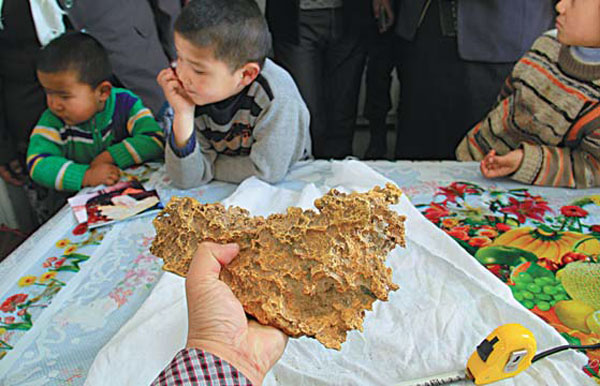What's news

| A "Cathay" tulip catches the attention of visitors at a flower show at Beijing Botanical Garden on Feb 11. The tulip became famous when it was named by Chinese first lady Peng Liyuan on her visit to the Keukenhof garden, in Lisse, the Netherlands, with President Xi Jinping in March. Wang Zhuangfei / China Daily |
UK, China to kick off cultural exchange
This year marks a turning point in cultural exchanges between the United Kingdom and China.
For the first UK-China Year of Cultural Exchange, China will showcase the very best of its culture in the UK and vice versa.
The series of events was formally announced when Premier Li Keqiang visited the UK in June 2014. It comprises two seasons of cultural events - a UK season in China from March until July led by the Cultural and Education Section of the British embassy; and a Chinese season in the UK for the second half of the year that is being led by the Chinese Ministry of Culture.
The exchange events will provide a platform for individuals, organizations and governments to strengthen ties in the arts and creative industries.
Xi urges quick work on Asian investment bank
President Xi Jinping wants to accelerate work to establish the Asian Infrastructure Investment Bank and called for "concrete investment plans" under China's $40 billion (35.3 billion euros) Silk Road Fund.
At a central government finance meeting on Feb 10, Xi said the bank's main mission will be to provide financial support for infrastructure projects in Asia and along the land-based and maritime Silk Road economic belts.
He said the bank will supplement fundraising channels for infrastructure projects. He added that the Silk Road Fund should be managed under market-driven principles.
The bank was created in October when 21 Asian countries agreed to join as founding members. In November, Xi announced the creation of the Silk Road Fund, part of a national strategy to revive the centuries-old trading route connecting Asia and Europe.
At the Feb 10 meeting, Xi also said China should work more efficiently to establish an oil reserve system and an energy pricing reform that closely follows global market changes.
Wanda acquires Swiss sports marketer
Dalian Wanda Group, a property developer and entertainment conglomerate, recently acquired Infront Sports & Media, an international sports marketer and football promoter. The acquisition cemented Dalian Wanda's status as a competent player in the global sports market.
The company announced the deal on Feb 10 to buy out the Swiss-based sports marketing giant from European private equity company Bridgepoint for approximately $1.2 billion (1.05 billion euros).
Wanda will take a 68.2 percent stake in Infront, which focuses on distributing media rights for broadcasting sporting events, including the FIFA World Cup and several Winter Olympics sports.
Wanda Group Chairman Wang Jianlin said Infront's expertise allows Wanda to better support the development of football in China.
Two central govt ministries rebuked
China's anti-corruption authority reprimanded two central government ministries on Feb 10 for poor management and bad behavior among staff members.
In a rare move, the Central Commission for Discipline Inspection issued statements leveling criticism at two highly placed ministerial-level government bodies: the Ministry of Culture and the Ministry of Environmental Protection.
The commission said the Ministry of Environmental Protection committed violations of the law, displayed lax supervision and is suspected of corruption.
Ji Lin, head of the third central disciplinary inspection team, said corruption and a lack of supervision are behind widespread violations of the law and regulations in environmental assessments of development projects.
Violations include allowing construction to be carried out before an approval is granted and allowing modifications to projects without approval from environmental authorities, Ji said.
The Ministry of Culture recently appointed a new minister and the Ministry of Environmental Protection may soon change its leader.
Qualcomm hit with $975m antitrust fine
China's antitrust regulator has fined Qualcomm Inc, the world's largest chipmaker, 6.08 billion yuan ($975 million; 860 million euros ), the highest penalty since China's antitrust law took effect in 2008.
The fine amounts to 8 percent of Qualcomm's 2013 revenue in China. The company's shares rose 1.2 percent to close at $67.11 in New York on Feb 9 following the announcement.
The National Development and Reform Commission said on Feb 10 the key factors that led to the record fine include unfair and excessively high royalty payments Qualcomm collected from Chinese smartphone makers, bundling of products and adding unreasonable conditions to the sale of baseband chips.
A baseband chip in wireless transmission devices, such as mobile phones, processes signals and implements the device's real-time radio transmission operations.
Xu Kunlin, head of the anti-monopoly bureau at the commission, told reporters on Feb 10: "Our purpose is to maintain fair competition in the industry. Some practices have hindered the innovation capability of other companies."
Li promises to ease way for talented foreigners
Premier Li Keqiang pledged renewed efforts to ensure benefits for talented foreigners and made no secret of China's desire to attract more overseas talent.
China will lower the threshold for foreigners to come to the country and streamline procedures for them to invest and start businesses here, Li said at a Feb 10 meeting with foreign experts at the Great Hall of the People in Beijing.
The country will offer more international products and services for foreigners, he said in the meeting held by the State Administration of Foreign Experts Affairs.
Li also promised a simpler visa policy and an easier path to a permanent residency permit, or green card, in China.
Former premier on list of top philanthropists
Former premier Zhu Rongji was honored as one of the country's most generous donors by the China Philanthropy Research Institute of Beijing Normal University.
Zhu, 87, donated 15.2 million yuan ($2.43 million; 2.15 million euros) to the Practical Education Foundation in 2014. He also made the list in 2013.
Zhu, who served as premier from 1998 to 2003, has also written several bestseller books, including Zhu Rongji Meets the Press and Zhu Rongji's Answers to Journalists' Questions. He said he would donate the proceeds from his books to help students in poverty-stricken areas.
"It's impressive to see a former national leader making such donations that bring him closer to the people," said Tao Chuanjin, director of the Research Center of Philanthropy and Social Enterprise at Beijing Normal University.
Site alleges corruption in 70 listed firms
Corruption is rife in at least 70 publicly listed companies, according to an online financial information site.
According to Hithink Royalflush Information Network, based in Hangzhou, Zhejiang province, out of 70 companies plagued with corruption, 18 are in industries such as oil, coal mining and nonferrous metals.
Six of the 70 are in the real estate sector and another six are financial companies.
State-owned and private companies are among those with executives suspected of being corrupt and of having corrupt official ties, Hithink said.
"Nearly all corrupt officials had ill-gotten incomes from business organizations," according to a recent editorial by Beijing-based Guangming Daily.
Imports and exports plummet in January
China's foreign trade stumbled 10.8 percent to 2.09 trillion yuan ($341 billion; 296 billion euros) on a year-on-year basis in January.
The country's exports slid 3.2 percent to 1.23 trillion yuan while imports slumped 19.7 percent to 860 billion yuan, expanding the trade surplus by 87.5 percent to 366.9 billion yuan, according to General Administration of Customs on Feb 8.
A drop in foreign commodities preceded the sharp decline in imports as coal tumbled by nearly 53.2 percent, refined oil dropped by 37.6 percent and steel slid by 14.7 percent from the same month a year earlier.
"The weak manufacturing activities and a bearish housing market have caused domestic demand for commodities, including refined oil, industrial metals and plastics, to decline," said Zhao Zhongxiu, a professor at the University of International Business and Economics in Beijing.
Zhao said January's depreciation, trade surplus, combined with a downturn in exports and imports, complicates the government's management of exchange rates.
Youth winter games boost bid for Olympics
While a host for the 2022 Winter Olympics has yet to be announced, China is getting more young people involved in winter sports by staging the inaugural national students' winter games soon.
Beijing is bidding jointly with the ski resort of Zhangjiakou, Hebei province, to host the Winter Olympics. The Games' host will be announced on July 31.
In an aim to promote winter sports, the 2015 "Future Star" National Sunny Youth Winter Sports Meet, the first of its kind, will open at Jingpo Lake scenic park in Mudanjiang, Heilongjiang province, on Feb 11.
More than 600 students from 31 provinces and municipalities will take part in the six-day winter sports gala.
The event is being organized by the General Administration of Sport of China, the Ministry of Education and the Communist Youth League.
Premier berates officials for neglecting duties
Premier Li Keqiang has asked local government officials to sign a written pledge to carry out major economic and social policies faithfully, saying that dereliction of duty has set back central government economic growth measures.
Li said large projects and investment plans backed by the central government - especially in agriculture and water conservation - were not fully implemented by local officials last year.
"The problem originates from the mental outlook of some officials who failed to take their share of the responsibility," Li said at a meeting on clean governance on Feb 9.
"Some officials are taking a wait-and-see attitude, being reluctant to implement major policies of the central government, and not caring about their own political achievements," Li said.
Hundreds of Chinese taste test GM rice
Hundreds of people were invited via the Internet to eat genetically modified rice at restaurants in 23 cities across China on Feb 8 in a move to promote GM foods to the public.
Wu Xingchuan, editor-in-chief of the science website scipark.net, which organized the event, said: "We are trying to get a message across to those who still doubt the safety of GM products: We believe that GM rice is safe, and we are more than willing to eat it."
According to the first policy document issued by the Communist Party of China Central Committee in January, China will strengthen research and manage the safety of GM foods.
| A shepherd found what is thought to be a piece of natural gold weighing 7.85 kilograms in an abandoned mine in Qinghe county, Altay prefecture, the Xinjiang Uyghur autonomous region on Jan 30. Zhu Xinfeng / China Daily |
(China Daily European Weekly 02/13/2015 page2)
Today's Top News
- Japan tempting fate if it interferes in the situation of Taiwan Strait
- Stable trade ties benefit China, US
- Experts advocate increasing scope of BRI to include soft power sectors
- New engine powers cargo drone expansion
- China to boost green industry cooperation
- Manufacturing PMI rises in November
































